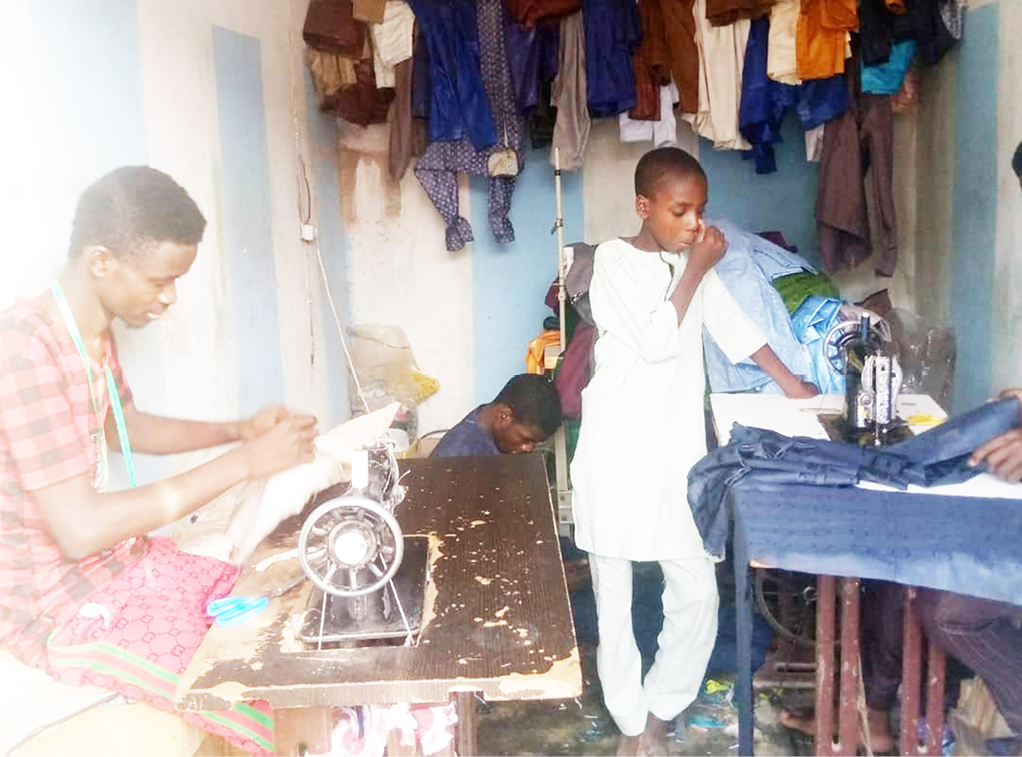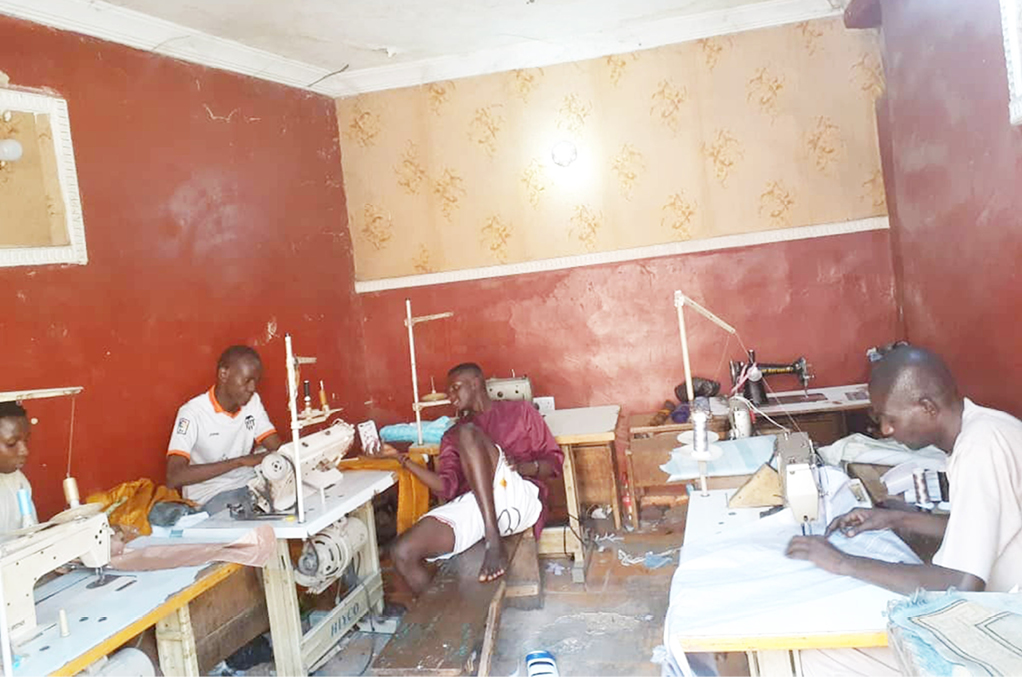Sallah: How tailors battle to meet targets
As the Ramadan fasting is gradually getting to an end, Muslim faithful are in preparatory mood to celebrate the end of the holy month of Ramadan with the Eid-el-fitr festivities. As a tradition, Muslims prepare feasts and make new clothes to celebrate the fulfillment of the spiritual exercise. Thus, tailors are major stakeholders who make […]

Tailors at work
As the Ramadan fasting is gradually getting to an end, Muslim faithful are in preparatory mood to celebrate the end of the holy month of Ramadan with the Eid-el-fitr festivities. As a tradition, Muslims prepare feasts and make new clothes to celebrate the fulfillment of the spiritual exercise. Thus, tailors are major stakeholders who make the celebration unique with customised clothing styles, Daily Trust Saturday reports.
Like all other economic activities, tailors work diligently to satisfy their clients’ need while eking out a living. In preparation for the Eid-el-Fitr celebration, tailors are very busy at the moment (especially in the northern parts of the country), trying to meet up with delivering clients’ apparels on time. However, some of the tailors in Kano identified key challenges that make their work condition extremely hostile.
Abubakar Dayyab, a tailor in Kano city, who has been in the business for over a decade, said rising cost of materials and acute power shortage are the major impediments to meeting his targets and deadlines.
In a chat with Daily Trust Saturday, Dayyab said clients are trooping in with their materials as usual and that he would soon halt accepting from late comers.
“There is really much work now, especially with the Ramadan fast gone halfway. People are bringing their fabrics for us to work on. In fact, we will soon stop accepting because it is getting late already.”
According to him, “Electricity is one challenge we are battling with. Since the commencement of the fasting, there has been decline in the supply of electricity in my area and it is affecting our business. We need it for design, we need it for ironing, we need it for even sewing the clothes because our machines are electric-powered.”
He further averred that “This has affected how we charge customers. On the average, we charge between N3,000 and N10,000 depending on the style. There are designs that we used to charge between N2,000 and N4,000, but not anymore.”

He stressed that stable power supply and new machines are what he currently needs to continue to succeed in his vocation.
Another tailor, Kabiru Aminu, who lamented low patronage this Ramadan period, said acute shortage of electricity and weak purchasing power from his clients are taking a toll on his business.
He observed that “there isn’t much work this Ramadan like we used to have in the past. This is probably due to the current economic realities in the country. People are now thinking of what to eat to remain alive rather than talking about clothing.”
Aminu said in addition to not having a lot of clients, serving the available customers is increasingly becoming a herculean task due to some seeming unforeseen circumstances.
“You see, things have changed. If you want to remain relevant and up-to-date in this vocation, you need a sort of conversion from the “butterfly” sewing machine to the current industrial machine. This isn’t an option; it is a must because it is only the industrial one that gives perfect design to the satisfaction of your clients. Those sample of clothes you see on social media are usually designed using industrial machines. So, imagine a customer gives you a sample he or she obtained from social media and you cannot do it perfectly! You are likely to lose that customer,” he explained.
He said that another serious challenge is the inconsistency in power supply which is a necessity for the operation of the latest machine he uses.
“Since the commencement of the fasting when clients patronage increased, power supply declined significantly and that is when it is needed most. Sometimes, we don’t see light for complete 24-hours. Don’t talk about fuel, it is a big problem,” he added.
He noted that tailoring is “No longer as lucrative as it used to be but we are managing. If I just get a better industrial sewing machine and stable power, I am okay.”
A female tailor, Maryam Ishaq Malamdi of Kofar Arewa, who identified unique challenges facing female tailors, disclosed that in her 19 years of working as a tailor, this Ramadan comes with very low patronage from her clients.
“Honestly, it is unlike a few years back when we had so much clients bringing their fabrics. My loyal customers who used to bring five to six sets of clothes at a time for sewing now bring one or two, others even none, due to the economic condition of the country.”
While narrating some of the challenges, she said “The cost of sewing materials has gone up and sometimes clients would bring in work and make part payment, but the part payment may not even cover the cost of materials needed for the work. If you fail to deliver, they would blame you.”
She corroborated other tailors’ lamentation that lack of electricity supply remains their biggest challenge as they work towards meeting deadlines. “The power failure alongside high cost of materials is really a big challenge. Every time I go to purchase materials, there will definitely be increment in prices.”
Maryam said she no longer uses electric powered sewing machine for her work. “I personally stopped working with energy-powered machine because of the harsh economic climate. There is no electricity; to power your generator, fuel is very expensive and the customers cannot afford to pay for your services appropriately. We are just surviving since this is the only business I know.”
“I need support on my capital base. Unlike male tailors, as a female tailor, I don’t charge much because I know what people are going through. So, if I can get support to boost my capital, I will be very grateful. May be fellow female tailors should come together to form an association to support themselves,” she appealed.
For Abdullahi Dorayi, there is relatively much work for people in his shop at Dorayi Karama behind Bayero University Old Campus. He said although they are working to meet deadlines and satisfy their clients needs, he acknowledged that it comes with personal inconveniences aggravated by lack of steady supply of electricity during this period.
“You know electricity is everything as far as our work is concerned. In addition to using machines, we need light to illuminate the shop when it’s dark. We need fan to cool the environment to be able to work better. We don’t use generator all the time or else we will end up spending our profit on buying fuel and servicing the generator. Yet, we have to do a lot of overnight works to be able to meet up with deadlines,” he said.
